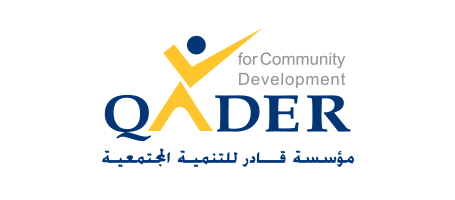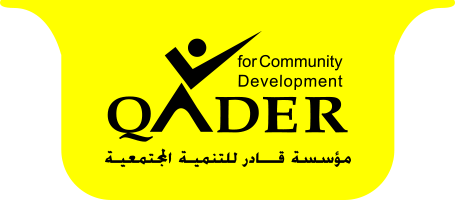On the eve of the International Day of Persons with Disabilities: The United Nations is powerless to protect Palestinians from the Israeli aggression on Gaza.

QADER for Community Development calls on the United Nations and the international community to intervene immediately to stop the aggression on the Gaza Strip and protect the Palestinians, especially marginalized groups such as women, children, the elderly, and persons with disabilities.
The organization stresses the need for urgent humanitarian aid to reach the Palestinians in Gaza, considering the specific needs of persons with disabilities, such as medications, consumables, medical supplies, assistive devices, and more.
Since October 7th, the residents of the Gaza Strip have been facing unprecedented military attacks, which have been described as ethnic cleansing by the United Nations Special Rapporteur on the Occupied Palestinian Territories, Francesca Albanese. These attacks have resulted in the martyrdom of more than 15,000 Palestinians, more than two-thirds of whom are women and children, in addition to 7,000 missing persons according to the Gaza government media office. Furthermore, 50% of the homes in Gaza have been destroyed according to the United Nations Development Program (UNDP).
The population of Gaza is approximately 2.3 million, with persons with disabilities making up around 7% of the population according to the 2011 Palestinian Disability Survey by the Palestinian Central Bureau of Statistics, though global estimates suggest that persons with disabilities represent 16% of the world's population. The ongoing siege and continuous aggression in Gaza for more than 16 years have led to a significant increase in the number of persons with disabilities in the region.
According to data from United Nations organizations and international institutions, persons with disabilities are particularly vulnerable in emergencies and wars due to their specific conditions, which limit their ability to protect themselves and increase their exposure to accidents and danger. Article (11) of the Convention on the Rights of Persons with Disabilities emphasizes that "States Parties undertake, in accordance with their responsibilities under international law, to take all possible measures to ensure the protection and safety of persons with disabilities in situations of risk, including armed conflict, humanitarian emergencies, and natural disasters."
Forced Displacement
QADER has gathered information about persons with disabilities in Gaza through its emergency helpline for persons with disabilities and their families, operating around the clock since the start of the military aggression on the Gaza Strip. In a phone call to the helpline, a young man with a mobility disability from Gaza, A.Q. (32 years old), said: "The situation is catastrophic. We left Gaza City and displaced to Rafah, and things are very bad." He added, "My mental health is in very poor condition. Everywhere we go, there is bombing, destruction, and chaos." The call was abruptly cut off due to a loss of signal.
When Israeli forces bomb one of Gaza's neighborhoods, residents rush into the streets to avoid being trapped in the debris of their homes. But what happens if among these residents there are people with hearing disabilities (deaf)? Many people with hearing disabilities fled their homes without their hearing aids, making it impossible for them to communicate with the thousands of others seeking refuge in crowded shelters, leaving them feeling isolated from the surrounding world.
In an interview with AJ+ platform, Mohammad, the eldest son, translates for his mother Walaa and father Ahmed, who both have hearing disabilities. Walaa says: "We were sitting peacefully when suddenly the bombing started around us. We found ourselves running to the streets. We couldn't separate, we had to stay together. The planes were bombing, and we were scared. No one helped us." Ahmed adds: "My mom and dad can't hear. We fled and went to the hospital, and I helped them communicate with others."
Persons with disabilities in Gaza describe the difficulties they face while fleeing from Israeli attacks, especially due to the absence of effective warnings from the Israeli military, the massive destruction, and the rubble that makes it harder for them to move using wheelchairs and other assistive devices. The indiscriminate bombing and widespread destruction have also caused many persons with disabilities to lose their assistive devices when their homes were destroyed or damaged in Israeli airstrikes, leaving them homeless and unable to meet their basic needs. In an interview with Human Rights Watch, Abu Shaker (49 years old), who has a mobility disability, described how his neighbor's house was bombed, forcing him to flee. He said, "Everyone around me was running, and I just stood there feeling my disability."
The lead researcher for the Rights of Persons with Disabilities at Human Rights Watch, Amina Chiremovic, stated: "The large-scale ground attack launched by the Israeli military in Gaza has exacerbated the grave difficulties faced by persons with disabilities in fleeing, finding shelter, and accessing water, food, medicine, and the assistive devices they urgently need."
Although international humanitarian law and international human rights law protect the rights of persons with disabilities in armed conflicts, what we are witnessing in Gaza is a blatant violation of all international laws and conventions, as the occupying forces target all Palestinians, whether they are children, women, the elderly, or persons with disabilities, especially while they move through "safe" corridors announced by the occupying forces. However, according to media reports, the occupying forces have targeted displaced persons in those corridors, which they claimed to be safe.
Women and Girls with Disabilities
Women with disabilities in Gaza are facing compounded violence during the war. Like other members of society, women, including those with disabilities, lack protection. The bombing continues unabated, claiming the lives of more than 4,000 women, and civilians, including women, are being deliberately targeted in blatant violations of all international conventions and agreements.
W.A. (35 years old), a woman with a visual disability, suffers from high blood pressure, anemia, malnutrition, and is six months pregnant. She has recently developed gestational diabetes. Her house was bombed, forcing her and her family to flee to a shelter under extremely difficult conditions. She says, "Our situation is very bad. Our houses were bombed while we were inside, and the living conditions in the shelters are very difficult. I am in my sixth month, and the baby's condition is very weak, with minimal movement."
The right to health is one of the most important human rights, especially for persons with disabilities, as it is directly related to their right to life, particularly in times of crisis, war, and emergencies, when wars exacerbate the deteriorating health conditions of the entire community, especially its marginalized segments, including persons with disabilities. This is especially critical given the difficulty in accessing adequate healthcare services.
Shelters Are Unfit for Living
According to the United Nations Relief and Works Agency for Palestine Refugees in the Near East (UNRWA), the number of displaced persons in Gaza has reached approximately 1.8 million since October 7, living under harsh conditions in hospitals and UNRWA schools due to overcrowding, water and food shortages, and poor sanitary facilities. In total, there are 150 shelters designated by UNRWA, with the average number of displaced persons in each shelter exceeding two and a half times its capacity. The shelters are not equipped to meet the needs of displaced persons with disabilities, who make up a significant proportion of the displaced. The suffering is intensified for tens of thousands of displaced persons with disabilities, the wounded, and the sick, including children, in the absence of any available assistive devices and basic hygiene supplies.
According to a report published by Al Jazeera on its website, seven-year-old Wiam sits in her wheelchair in front of one of the UNRWA refugee shelters and cannot find a place to sleep except for a piece of cloth she spreads under her small body at night. Wiam says: "We came from Khaza'a east of Khan Younis at the beginning of the war. I am always worried about my family's feelings and their fear for me when the bombing happens. We must leave, and my movement is difficult. I am afraid to expose anyone to danger."
The occupying state cut off all water supplies to Gaza on October 11, in blatant violation of basic international humanitarian law during wartime. Persons with disabilities and their families, according to statements received by QADER staff, reported limited access to clean drinking water, with groundwater being their only option. The United Nations Office for the Coordination of Humanitarian Affairs (OCHA) had previously reported that most of Gaza's groundwater is unfit for human consumption, and the Palestinian Water Authority in Gaza confirmed that 97% of the groundwater does not meet global standards for safe drinking water.
There is also a significant shortage of food and poor quality, especially for persons with disabilities who have special diets. There is no provision for the needs of individuals with digestive disorders, dysphagia, and other conditions related to specific disabilities.
Furthermore, most displaced persons with disabilities face difficulties using toilets in schools, hospitals, and shelters they have sought refuge in, as these facilities are not adapted for their needs. There is also a severe shortage of basic hygiene supplies such as toilet paper and soap, contributing to the spread of infectious diseases. Thousands of Palestinians are being held in shelters that are ill-prepared to accommodate them, while they continue to face continuous bombardment and a siege that targets everyone without distinction.

